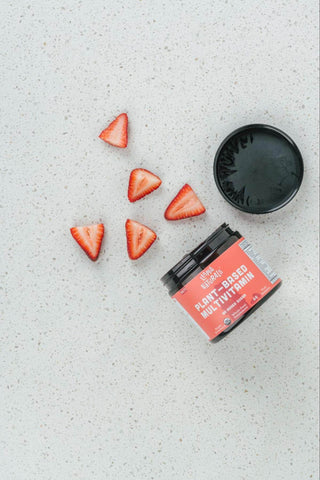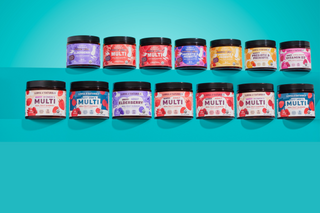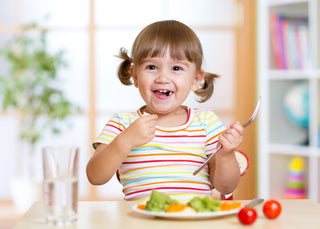
Key Points:
- Your child may be struggling with riboflavin deficiency, an all-important nutrient for their health and wellness.
- Help your little one meet their daily riboflavin intake through a balanced diet.
- But if your child is a picky eater, ask your pediatrician if a dietary supplement of riboflavin for kids can help.
From birth to adulthood, riboflavin ranks high on the list of nutrients important for a kid's growth and development. As one of the eight B vitamins, riboflavin is a main actor in many cellular processes, from energy production to red blood cell synthesis.
While the general population in America gets enough riboflavin from their daily diet, certain groups, like kids, are more at risk of this nutrient deficiency. Ahead, you'll learn how riboflavin benefits your child's well-being and what you can do to help them meet their nutritional intake for this essential antioxidant.
Disclaimer: This post is intended for informational purposes only. It should not be taken as medical advice from a healthcare provider.
Riboflavin for Kids 101
Riboflavin, or vitamin B2, is one of the eight B vitamins (some of which you may have already heard of):
- Thiamine (vitamin B1)
- Riboflavin (vitamin B2)
- Niacin (vitamin B3)
- Pantothenic acid (vitamin B5)
- Pyridoxine (vitamin B6)
- Biotin (vitamin B7)
- Folate or synthetic folic acid (vitamin B9)
- Cobalamin (vitamin B12)
Aside from vitamin C, B vitamins are the only water-soluble vitamins. That means whatever vitamin that's not used by the body is eventually passed out as waste material.
The Risk of Riboflavin Deficiency
It can be hard to get your child to eat enough foods that offer riboflavin. Most likely, riboflavin-containing foods, such as spinach, mushrooms, and almonds, just don't hold the same appeal as a chocolate glazed donut, for example. (Which we can totally relate to!)
Also, if your kid is a vegan, they are less likely to pile riboflavin-rich foods on their plate. Throw physical activity into the mix, and their diet isn't supplementing them with enough vitamin B2 to meet their daily needs.
But, riboflavin deficiency isn't just limited to a kid's palate. A lack of this essential nutrient can start at birth, too.
Research indicates that "the risk of riboflavin deficiency in pregnant women is especially high during the third trimester." This risk may even continue on into their breastfeeding journey. If you're currently expecting and not consuming enough riboflavin, chances are your baby could be born deficient in the nutrient, too.
The fallout from riboflavin insufficiency is wide-ranging, from sore throat and thinning hair to anemia (too few red blood cells) and even an impaired nervous system. Safe to say, riboflavin deficiency is nothing to sneeze at.
Potential Benefits of Riboflavin for Kids

Okay, you're now aware of the prevalence and dangers of vitamin B2 deficiency. But what about the potential benefits of riboflavin for kids? We're happy to say that there are quite a few, as you'll see below.
Essential for Energy Production
When your kid polishes off their after-school snack, riboflavin helps break down the macronutrients — carbohydrates, proteins, and fats — into fuel their bodies can use for energy production. It's why your loved one goes straight from "I'm so tired" to a human-sized Energizer Bunny after their snack.
P.S.: You may also be interested to know that riboflavin doesn't just metabolize the macronutrients. It also helps the body take in folate and vitamin B6 that are essential to a robust immune system.
May Help Reduce Headaches
Another potential benefit of riboflavin for kids lies in warding off pediatric migraine headaches.
A small-scale study of 41 children and adolescents examined the effects of high-dose riboflavin (either 200 milligrams or 400 milligrams per day) for migraine prophylaxis (long-term migraine prevention therapy). The results were astonishing — participants had fewer and less severe headaches after three months of treatment.
Promote Red Blood Cell Production
Remember when we said too little riboflavin can lead to anemia? That's because vitamin B2 is a vital ingredient in the creation of red blood cells.
With enough riboflavin in your child's system, they are more likely to maintain healthy levels of oxygen-carrying red blood cells. As such, think of this antioxidant as a natural talisman against fatigue, breathlessness, and other not-so-fun side effects of anemia.
Support a Healthy Nervous System
B-complex vitamins, including riboflavin, help your kid's nervous system run smoothly. Zeroing in on vitamin B2, it's the pièce de résistance in myelin production. If you haven't heard, myelin is a protective layer that coats the nerve cells. In that sense, riboflavin helps promote healthy nerve functioning.
Is Your Child Getting Enough Riboflavin?
The National Institute of Health recommends the optimal amount of riboflavin for kids according to different age groups:
- Age 0-6 months: 0.3 milligrams
- Age 7-12 months: 0.4 milligrams
- Age 1-3 years: 0.5 milligrams
- Age 4-8 years: 0.6 milligrams
- Age 9-13 years: 0.9 milligrams
- Age 14-18 years: 1.3 milligrams for boys and 1.0 milligrams for girls.
(Note: If you're pregnant or breastfeeding, aim for 1.4 milligrams and 1.6 milligrams respectively.)
But how does that translate into real-life eating? To help you out, one apple provides 0.1 milligrams of riboflavin. Meanwhile, a half cup of grilled portabella mushrooms gives your child 0.3 milligrams of riboflavin.
Whole Foods With Riboflavin
A good starting point to get more riboflavin into your little one's diet is through whole foods. Here's a list of riboflavin-rich foods to get your culinary skills going:
- Green vegetables, like spinach, asparagus, and broccoli
- Eggs
- Nuts, like almonds
- Mushrooms
- Avocados
- Lean meats, like chicken breast
- Fortified grains, like breakfast cereals
The good news is, you don't have to resort to making airplane noises to convince your child to eat healthy, riboflavin-infused foods.
Think out of the box with creative food recipes. For example, transform boring ol' spinach and scrambled eggs into spinach muffins and breakfast egg cups. Your little one is less likely to turn up their nose.
Also, get them involved in the food-making process to pique their interest. When children are responsible for mixing the muffin batter or whisking the eggs, they are more likely to scarf down their "creations" once the table is set. (And the additional clean-up may be worth helping your kid form a healthy relationship with food.)
Riboflavin for Kids Supplements

Sometimes, the most creative food recipes may not be enough to tempt your kid with vitamin B2-rich foods. In cases like this, a riboflavin dietary supplement may help (provided that your pediatrician gives you the green light).
Riboflavin for kids usually comes in the form of multivitamins, B-complex supplements, and riboflavin-only vitamin supplements. As the US Food and Drug Administration (FDA) regulates dietary supplements differently than food and drugs, do your research to check that the brand you’re buying from is indeed trustworthy. Don’t forget, read the product label and check the reviews carefully.
Given the wide selection of dietary supplements out there, the shopping process can be a little overwhelming. Our advice: Pick the riboflavin supplement that's best tailored to your kid's dietary needs. For example, if they aren't getting enough vitamin C and vitamin D, on top of riboflavin, a multivitamin containing all three nutrients will work best in their favor.
If you're looking for a supplement just like this, Llama Naturals Gummy Multivitamin for Kids might be a great choice. Each serving (aka two gummies) gives your child 0.65 milligrams of riboflavin (aka, 108% of the Recommended Dietary Intake for 4-8 year olds) to help supplement their daily intake of this all-important nutrient.
You'll also be happy to know that our organic gummy vitamins are made from real fruit and veggies, slow-cooked to retain all the nutrients. They’re also free from any nasties like sugar or artificial sweeteners, so you won’t have to worry about potential sugar highs. Also, rest assured that our vitamin supplements exclude artificial colors or flavors, preservatives, gluten, and other common allergens.
Riboflavin for Kids Help Support Optimal Health
Riboflavin for kids has many potential benefits for their overall health and wellness. Ensuring they get enough vitamin B2 helps keep various body functions running smoothly, so your child can live their best life.
Of course, nutritionists around the world will champion a balanced diet to avoid riboflavin deficiency. But let's face it, many kids are picky eaters.
Not to worry — a riboflavin supplement, like Llama Naturals Plant-Based Multivitamin, can help you — and your kiddo — out here. Packed with 13 essential nutrients in a delicious strawberry flavor, this is one dietary supplement your little one will look forward to every day.
Llama Naturals is a plant-based nutrition brand that has created the World's First Whole Fruit Gummy Vitamins that are made with no added sugar and whole-food vitamins. They are USDA Organic, Vegan, Gluten-Free, free of common allergens, and are slow-cooked on low heat to retain rich phytonutrients & fruit flavor. It’s a win-win gummy vitamin that you and the family will love.




